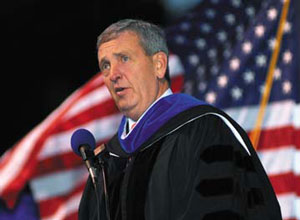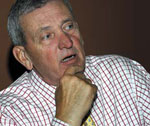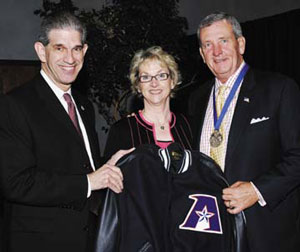| Defining the brand | Advertising the brand | Living the brand |
| Home Forethought President's Message Campus Buzz Feature Stories Re:Search The Score Alum News Yesteryear | ||
 Retired Gen. Tommy Franks (’71 BBA) is often asked if he’d
change anything about his life. “Yes,” he answers, but with some notable
exceptions. He’d marry the same woman. He’d still join the U.S. Army. And he’d
always treasure the time he spent at UT Arlington. Franks, a four-star general
who led the country’s military actions following Sept. 11, urged students at the
spring Graduation Celebration to heed the advice that a friend gave him: “If
you’re not living on the edge, you’re taking up too much room.” He recently
spoke with Danny Woodward following a campus luncheon in his honor.
Retired Gen. Tommy Franks (’71 BBA) is often asked if he’d
change anything about his life. “Yes,” he answers, but with some notable
exceptions. He’d marry the same woman. He’d still join the U.S. Army. And he’d
always treasure the time he spent at UT Arlington. Franks, a four-star general
who led the country’s military actions following Sept. 11, urged students at the
spring Graduation Celebration to heed the advice that a friend gave him: “If
you’re not living on the edge, you’re taking up too much room.” He recently
spoke with Danny Woodward following a campus luncheon in his honor.
You began your college career at UT Austin. What led you to enroll at
UT Arlington?
I had just come back from Vietnam. Cathy and I had
just gotten married. I was going to leave the military to go back to school
because I didn’t have a degree. The Army made an offer we couldn’t refuse, which
was to send us back to school. They asked me where I wanted to go to school. I
had known several people who had graduated from UTA. So I said, “Well, I think
I’ll apply to UTA.” I was accepted and came down here and loved it.
What was your typical day like as a UT Arlington
student?
I knew I had to finish 90 hours in two years. My academic
prowess in Austin was not top of the stack. I had focus back in those days, but
it didn’t have anything to do with books or grades or classes. I was bound and
determined to get it done and get it done right this time. So I’d get up in the
morning around 5:30, sit around the house and study for an hour or an hour and a
half. Then, depending on what my class load might be, I’d spend the day in the
library. I literally spent days in the library here. It taught me, or I taught
myself, how to focus and how to study. It was a good time for me.
|
|
Academic recognition is a favorite memory. After my dismal performance in Austin, I came up here, and I was enlisted in Alpha Chi honor society and Omicron Delta Epsilon economics honor society. Cathy and I had our first and, in fact, only child, who was born while we were in school here. We were not out partying. We were here to study and have the baby and get the work done.
Were there faculty and staff members who had a big impact on
you?
George Fortenberry is always the one I mention by name because
he is most vivid in my memory. The reason is because of his passion for the
language. He was an English professor, and I just had such respect for him and
still do. George Fortenberry wouldn’t remember me in a crowd of two. I was just
a student in his class. But he had a great effect on me and on my appreciation
of the English language.
In what ways did UT Arlington prepare you for your
career?
UT Arlington did a lot to teach me how to think. I don’t
recall a single professor ever trying to tell me what to think. It was about how
to think, how to process information, how to gain an education. I had great
respect for it, and I still do.
What lessons did you learn that weren’t in textbooks?
I
learned some here and I learned quite a few in a military context, mostly after
I attended UTA and formed an opinion about how to learn. A thought that pops
into my mind is from my childhood. My dad asked me if I knew the difference
between being smart and being wise. I told him I had no idea. He said it was
experience. That really sticks with me as one of the most valuable constructs of
my life. You can have great intellectual acuity, but if you have no appreciation
of effect, then you really will not be a wise person.
 Describe your emotions on Sept. 11,
2001.
Describe your emotions on Sept. 11,
2001.
My emotions ran the range from fear to a sense of impending
doom. When I got the word, I was in Greece headed for Pakistan. I took the air
crew out to eat the night of 9-11. We went to a Greek restaurant. When we walked
in, the demeanor of all the Greeks in the restaurant, the sense of concern and
sympathy that they had, affected me in a way that I suspect many Americans were
affected. I worried about my family. I was not at all confused about the source
of the problem. I had a conversation with [Defense] Secretary Rumsfeld. He asked
me what I thought and I told him Bin Laden, al-Queda, Afghanistan.
What were your emotions like when the campaigns started in
Afghanistan and Iraq?
Any leader recognizes responsibility for the
lives of the people around him. In both places, I never doubted that the
enterprise would be successful. But one always worries about how to keep as many
people alive as possible while getting the job done. The weight of
responsibility to others is what was on my mind as we initiated both
campaigns.
What do you consider to be the most memorable experience of your
career?
The most important event of my career is also the most
important event of my life, and that’s getting married to the lady across the
table. There are those who would say that I’ve never grown up. But I didn’t
start to grow up until I got married. I would not tell you that the most
significant time in my life was time spent with a president or some very senior
person or a king or an emir, because there have been many of those occasions.
The thing that’s most important to me started out with getting married in 1969
to the woman who is still my wife after 37 years.
How do you describe the road to becoming a four-star
general?
Every leader in the military works with some talented and
gifted young people. It’s a bright leader who recognizes that fact. Young people
in our armed services will make the general look better than the general ever
is. That was the case with me. I respected them, and I still do. I trusted them,
and I still do. I went to them for counsel and advice, and I still do. As the
mascot of this university implies, I am a maverick and have always been a
maverick. I never had a grand design of how to do something well in the
military. I was worried about doing the job at hand today in the best possible
way. I am not politically astute and never have been. I’ve never been interested
in what my bosses thought of me, but I’ve always been interested in what the
troops thought of me. At the end of the day, if you will let the troops make you
look good, they will.
Now that you’re retired, what things are you involved
with?
I sit on a couple of public boards. I sit on a bunch of
nonprofit boards of directors. I’m interested in the education of military
children. My wife sits on the board of MCEC (Military Child Education
Coalition). I work with her on that. The idea there is to make sure that
military children are not disadvantaged by the fact that their moms and dads are
constantly moving through school systems all over the country. I’m interested in
philanthropic work that recognizes the contributions of Americans like those on
Flight 93. I co-chair along with Gov. Tom Ridge the Flight 93 Memorial
Foundation. We’re working to build a memorial in Pennsylvania to those heroes
who lost their lives on 9-11. We have to be sure they’re never forgotten. I’m
also working on a memorial for Central Command in Tampa, Fla., and a variety of
things like that.
Do you want to stay in the public eye?
No. I have a
speaking agent, the Washington Speakers Bureau, and we do speaking for pay. I’m
interested in visibility at that level. I’m not interested in political
visibility. I don’t shy away from stating my opinion. But I don’t seek out
American media in order to make myself something I’m not.
What’s the secret to your success?
I learned from a
loving family 50-plus years ago that the things important in this country are
family, faith and the flag. I believe that we’re a nation founded on values. And
I believe that when people get hokey and self-serving, at the end of the day it
shows. I don’t think that those people turn out to be as successful as they
would like to be. I’ve been blessed to live in a country that deserves respect.
The United States of America, there’s none other. I’ve been blessed by the Lord,
and I’ve been blessed by a family that has loved me, nurtured me and in some
cases tolerated me. So at the bottom end of all of it, I guess you’d say that
there’s been a degree of luck.
How would you like to be remembered in history books?
As
a corny guy who meant what he said, did what he said he would do, treasured his
family and his faith and recognized the importance of a country where we’re all
free to be everything we want to be. But it doesn’t come either cheap or free.
As a guy who was concerned about those with whom he worked and those for whom he
was responsible.
What advice would you give UT Arlington students?
Take
advantage of your ability to learn, not only from the book or the professor, but
from those around you. Don’t try to grow up too fast. The world will wait for
you. Grow up solid. Grow up with strong roots. Don’t waver with the wind. Be
proud of your family. Be proud of who you are as an individual, and always know
that you are among the greatest blessings of this country.
| Archives
| Alumni Association |
Giving to UT Arlington | UT
Arlington Home Copyright © 2006 UT Arlington Magazine. All rights reserved. |

